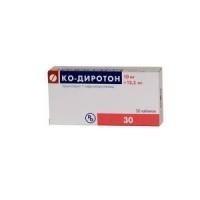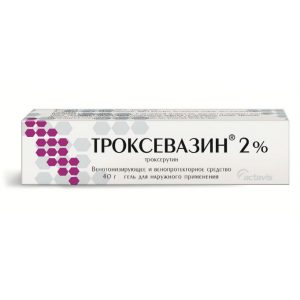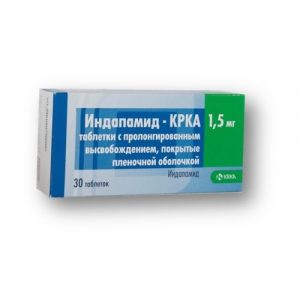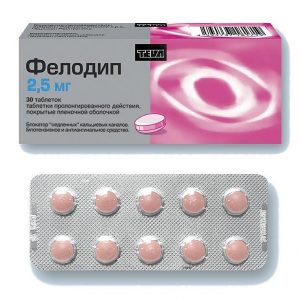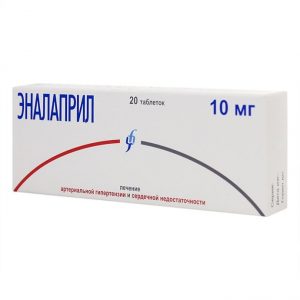Description
Release form
Tablets.
Packing
30 pcs.
Pharmacological action
Co-Diroton has antihypertensive and diuretic effects.
Contraindications
Hypersensitivity (including to other ACE inhibitors and a derivative of sulfonamides), anuria, angioedema (including a history of the use of ACE inhibitors), hemodialysis using high-flow membranes, hyperonema, hyperk , precoma, hepatic coma, diabetes mellitus (severe forms), pregnancy, lactation, age under 18 years (efficacy and safety have not been established).
Caution. Aortic stenosis, hypertrophic cardiomyopathy, bilateral renal artery stenosis, stenosis of a single kidney artery with progressive azotemia, condition after kidney transplantation, chronic renal failure (CC more than 30 ml / min.), Severe CRF (CC less than 30 ml / min), primary hyperaldosteronism, arterial hypotension, bone marrow hypoplasia, hyponatremia (increased risk of developing hypotension in patients on a low-salt or salt-free diet), conditions accompanied by a decrease in BCC (including diarrhea, vomiting), connective tissue disease (SLE, scleroderma), diabetes mellitus, gout, hyperuricemia, hyperkalemia, liver failure, cerebrovascular insufficiency, severe heart failure, advanced age.
Special instructions
The most pronounced decrease in blood pressure occurs with a decrease in fluid volume caused by diuretic therapy, a decrease in the amount of salt in food, dialysis, diarrhea, or vomiting.
In patients with chronic heart failure with simultaneous renal failure or without it, a marked decrease in blood pressure is possible. It is more often detected in patients with a severe class of chronic heart failure, as a result of the use of large doses of diuretics, hyponatremia, or impaired renal function. In such patients, treatment should be started under the strict supervision of a physician. Similar rules should be followed when prescribing patients with coronary heart disease, cerebrovascular insufficiency, in which a sharp decrease in blood pressure can lead to myocardial infarction or stroke.
Transient arterial hypotension is not a contraindication for further administration of the drug.
Before treatment, if possible, normalize the concentration of sodium and / or replenish the lost volume of fluid, carefully monitor the effect of the initial dose of the drug on the patient.
In patients with chronic heart failure, a marked decrease in blood pressure after starting treatment with ACE inhibitors can lead to further deterioration of renal function. Cases of acute renal failure are noted.
Patients with bilateral renal artery stenosis or a single kidney artery stenosis treated with ACE inhibitors showed an increase in serum urea and creatinine, usually reversible after discontinuation of treatment. More common in patients with renal failure.
Angioedema of the face, limbs, lips, tongue, epiglottis and / or larynx was rare in patients treated with ACE inhibitors, including lisinopril, which can occur at any time during treatment. In this case, treatment with lisinopril should be stopped as soon as possible and the patient should be monitored until the symptoms regress completely. In cases where there was swelling of only the face and lips, the condition most often goes away without treatment, however, it is possible to prescribe antihistamines. Angioedema with laryngeal edema can be fatal. When the tongue, epiglottis or larynx is covered, airway obstruction can occur, therefore, appropriate therapy (0.3-0.5 ml of epinephrine (adrenaline) solution 1: 1000 s / c) and / or measures to ensure airway patency should be immediately taken.
Patients who have had a history of angioedema not associated with previous treatment with ACE inhibitors may have an increased risk of developing it during treatment with an ACE inhibitor.
A cough was observed with an ACE inhibitor. The cough is dry, prolonged, which disappears after cessation of treatment with an ACE inhibitor. With a differential diagnosis of cough, cough caused by the use of an ACE inhibitor should be considered.
Anaphylactic reaction has also been observed in patients undergoing hemodialysis using high-permeability dialysis membranes (AN69 ®) who are simultaneously taking ACE inhibitors. In such cases, consideration should be given to using a different type of dialysis membrane or other antihypertensive agent.
When using drugs that lower blood pressure in patients with extensive surgery or during general anesthesia, lisinopril can block the formation of angiotensin II.
A marked decrease in blood pressure, which is considered a consequence of this mechanism, can be eliminated by increasing bcc.
Before surgery (including dentistry), an anesthetist should be warned about the use of ACE inhibitors.
In some cases, hyperkalemia has been reported. Risk factors for developing hyperkalemia include renal failure, diabetes mellitus, potassium supplements, or drugs that increase blood potassium (such as heparin), especially in patients with impaired renal function.
In patients who are at risk of symptomatic hypotension (on a low-salt or salt-free diet) with or without hyponatremia, as well as in patients who received high doses of diuretics, the above conditions must be compensated before treatment (loss of fluid and salts).
Thiazide diuretics may affect glucose tolerance, therefore, it is necessary to adjust the dose of hypoglycemic agents for oral administration. Thiazide diuretics can reduce kidney calcium and cause hypercalcemia. Severe hypercalcemia may be a symptom of latent hyperparathyroidism. It is recommended that treatment with thiazide diuretics be discontinued before a test to evaluate parathyroid function.
During the treatment with the drug, regular monitoring of potassium, glucose, urea, lipids in the blood plasma is necessary.
During the treatment period, it is not recommended to drink alcoholic beverages, as alcohol enhances the hypotensive effect of the drug.
Caution should be exercised when performing physical exercises, in hot weather (risk of dehydration and an excessive decrease in blood pressure due to a decrease in bcc).
Influence on the ability to drive vehicles and control mechanisms
During the treatment period, you should refrain from driving vehicles and engaging in potentially dangerous activities that require an increased concentration of attention and speed of psychomotor reactions, as dizziness is possible, especially at the beginning of the course of treatment.
Composition
1 tab. contains lisinopril 10 mg
hydrochlorothiazide 25 mg
excipients:
mannitol, an aluminum varnish based on the dye indigotine (E132),
dye iron oxide yellow (E172),
pregelatinized starch,
corn starch,
calcium hydrogen phosphate dihydrate,
magnesium stearate
Dosage and administration of
Co-Diroton is taken orally (dose calculation is calculated in terms of lisinopril + hydrochlorothiazide): 5-10 mg + 12.5 mg once a day.
If necessary, the dose can be increased to 20 mg + 12.5 mg or 20 mg + 25 mg once a day.
Side effects
Frequent: dizziness, headache.
Less frequent. From the CCC: a marked decrease in blood pressure, chest pain, rarely – orthostatic hypotension, tachycardia, bradycardia, the appearance of symptoms of heart failure, impaired AV conduction, myocardial infarction.
From the digestive system: nausea, vomiting, abdominal pain, dry mouth, diarrhea, dyspepsia, anorexia, taste change, pancreatitis, hepatitis (hepatocellular and cholestatic), jaundice.
From the nervous system: lability of mood, impaired concentration of attention, paresthesia, increased fatigue, drowsiness, convulsive twitching of the muscles of the limbs and lips, rarely – asthenic syndrome, confusion.
From the respiratory system: dyspnea, bronchospasm, apnea.
From the skin: urticaria, sweating, alopecia, photosensitivity.
Allergic reactions: angioedema of the face, limbs, lips, tongue, epiglottis and / or larynx, skin rash, itching, fever, vasculitis, positive results on antinuclear antibodies, increased ESR, eosinophilia.
From the hemopoietic organs: leukopenia, thrombocytopenia, neutropenia, agranulocytosis, anemia (decreased Hb, hematocrit, erythropenia).
From the genitourinary system: uremia, oliguria / anuria, impaired renal function, acute renal failure, decreased potency.
Laboratory indicators: hyperkalemia and / or hypokalemia, hyponatremia, hypomagnesemia, hypochloremia, hypercalcemia, hyperuricemia, hyperglycemia, increased urea and creatinine in blood plasma, rarely – increased activity of “liver” transaminases, hyperbilirubinemia, hypercholesterolemia, hypertriglyceridemia, decreased glucose tolerance.
Other: dry cough, arthralgia / arthritis, myalgia, impaired fetal kidney development, exacerbation of gout, vasculitis.
Drug interaction
Potassium-sparing diuretics (spironolactone, triamteren, amiloride), K + preparations, salt substitutes containing K + – the risk of developing hyperkalemia, especially in patients with chronic renal failure. Vasodilators, barbiturates, phenothiazines, tricyclic antidepressants, ethanol – increased hypotensive effect. NSAIDs (including indomethacin), ethrogens – a decrease in the antihypertensive effect of lisinopril. Li + drugs – slowing down the excretion of Li + (increased cardiotoxic and neurotoxic effects of Li +).
Antacids and colestyramine – decreased absorption in the digestive tract. Enhances the neurotoxicity of salicylates, weakens the effects of oral hypoglycemic drugs, norepinephrine, epinephrine and anti-gout agents, enhances the effects (including side effects) of cardiac glycosides, the action of peripheral muscle relaxants, reduces the excretion of quinidine.
Reduces the effect of oral contraceptives. Ethanol enhances the hypotensive effect.
Overdose
Symptoms: marked decrease in blood pressure, dry mouth, drowsiness, urinary retention, constipation, anxiety, increased irritability
Treatment: symptomatic therapy, iv fluid administration, control of blood pressure therapy, aimed at correcting dehydration and disturbances in the water-salt balance. Control of urea, creatinine and electrolytes in the blood serum, as well as urine output.
Storage Conditions
In a dark place at a temperature not exceeding 25 ° C.
Active ingredient
Hydrohlorotyazyd
Form of Treatment
tablets
Gedeon Richter Poland, Hungary
